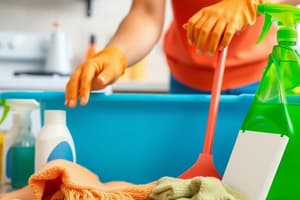Podcast
Questions and Answers
What does the verb 'put away' mean in household chores?
What does the verb 'put away' mean in household chores?
- Removing bad food from the fridge
- Putting thing in their places (correct)
- Cleaning the floor with a mop
- Loading the dishwasher
What is the purpose of 'dusting'?
What is the purpose of 'dusting'?
- To remove dust from surfaces (correct)
- To wash dishes effectively
- To clean the floor with a broom
- To organize paperwork
Which of the following chores involves cleaning using a vacuum cleaner?
Which of the following chores involves cleaning using a vacuum cleaner?
- Mopping the floor
- Sweeping
- Doing the laundry
- Vacuuming (correct)
What is meant by 'taking out the trash'?
What is meant by 'taking out the trash'?
What is the action described by 'hanging out the laundry'?
What is the action described by 'hanging out the laundry'?
Which activity involves replacing burnt-out bulbs?
Which activity involves replacing burnt-out bulbs?
What does 'organizing paperwork' include?
What does 'organizing paperwork' include?
What does 'clean out the refrigerator' involve?
What does 'clean out the refrigerator' involve?
What does 'do the laundry' mean?
What does 'do the laundry' mean?
Which task is typically performed to maintain surfaces by using a cloth?
Which task is typically performed to maintain surfaces by using a cloth?
Flashcards are hidden until you start studying
Study Notes
Household Chores Vocabulary
- Clean up/Tidy up: Organizing a room or area, often a challenge with children.
- Put away: Placing items in their designated spots (e.g., “put away your clothes”).
- Sweep: Using a broom to clean the floor.
- Mop: Cleaning the floor with a mop and water or cleaning solution.
- Vacuum: Using a vacuum cleaner to clean carpets and floors.
Dusting and Surface Cleaning
- Dust: The act of removing dust from surfaces, often called “to dust.”
- Dust off: Removing dust or dirt from an object or surface.
- Wipe down: Cleaning and drying surfaces using a cloth and/or cleaning solution.
- Polish: Making an object shiny and clean through rubbing (e.g., polish silverware).
Kitchen Chores
- Do the dishes: Common term for washing dishes. Alternative phrases include "do the washing up" or "wash the dishes."
- Load/Unload the dishwasher: Placing dirty dishes into the dishwasher or removing clean dishes from it.
- Clean out the refrigerator: Removing expired items and cleaning the fridge.
- Defrost the freezer: Removing ice buildup from the freezer.
- Take out the trash: Removing and disposing of garbage.
- Organize the kitchen cabinet/pantry: Arranging food items or supplies for better accessibility.
- Organize paperwork: Sorting and filing important documents.
Laundry Management
- Do the laundry: The process of washing, drying, and folding clothes.
- Hanging out the laundry: Placing wet clothes on a clothesline or drying rack to air dry.
- Declutter: Removing unnecessary items to create more space.
- Make the bed: Arranging sheets and blankets neatly on a bed.
- Change bed sheets: Replacing old sheets with fresh ones periodically.
Miscellaneous Chores
- Replace light bulbs: Exchanging burnt out bulbs for new ones.
- Grocery shopping: Buying food items and groceries from a store.
- Stock up on supplies: Purchasing necessary items in larger quantities or bulk buying.
Conclusion
- Enhancing English vocabulary by learning common household chore phrases allows for more detailed conversation.
- Incorporates practical actions in daily life with supportive phrases to facilitate better communication about domestic activities.
Household Chores Vocabulary
- Clean up/Tidy up: Refers to organizing spaces, often challenging in households with children.
- Put away: Involves returning items to their proper locations, like clothes.
- Sweep: The process of using a broom to remove dust and debris from floors.
- Mop: Involves using a mop with water or cleaning solution to wash floors.
- Vacuum: The action of utilizing a vacuum cleaner to clean carpets and various floor types.
Dusting and Surface Cleaning
- Dust: The activity of removing dust from surfaces, known as "to dust."
- Dust off: The action of cleaning off dust or dirt from specific objects or surfaces.
- Wipe down: Involves cleaning surfaces with a cloth or cleaning solution, followed by drying.
- Polish: The process of making items shiny by rubbing, commonly applied to silverware.
Kitchen Chores
- Do the dishes: A common term for washing dishes; alternately referred to as "doing the washing up."
- Load/Unload the dishwasher: Refers to placing dirty dishes into the appliance or taking out clean dishes.
- Clean out the refrigerator: The act of removing expired food items and sanitizing the refrigerator's interior.
- Defrost the freezer: Involves melting away ice buildup in the freezer for better functionality.
- Take out the trash: The routine of removing garbage from the home.
- Organize the kitchen cabinet/pantry: Arranging food and supplies for easier access and use.
- Organize paperwork: The process of sorting and filing important documents for better management.
Laundry Management
- Do the laundry: Encompasses the activities of washing, drying, and folding clothing.
- Hanging out the laundry: The action of placing wet clothes outside or on a drying rack to air dry.
- Declutter: The systematic removal of unnecessary items to increase space and reduce mess.
- Make the bed: Involves arranging sheets and blankets neatly each day.
- Change bed sheets: The periodic replacement of soiled sheets with fresh ones.
Miscellaneous Chores
- Replace light bulbs: The task of changing out burnt bulbs for new ones.
- Grocery shopping: The process of acquiring food and household items from a store.
- Stock up on supplies: Purchasing essential items in larger quantities or bulk to ensure availability.
Conclusion
- Expanding English vocabulary through common chore phrases enhances conversational abilities.
- Practical vocabulary is linked to daily actions, promoting effective communication regarding household tasks.
Studying That Suits You
Use AI to generate personalized quizzes and flashcards to suit your learning preferences.




